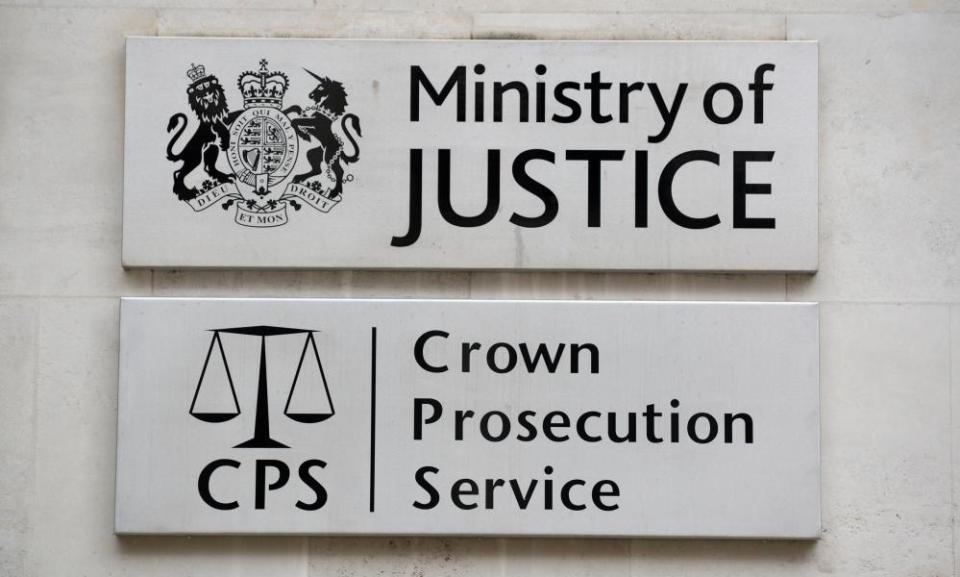CPS accused of 'systemic illegality' in charging rape cases

The Crown Prosecution Service (CPS) has been accused of “systemic illegality” in its approach to charging rape cases in a landmark judicial review into how the crime is prosecuted.
On the opening day of the hearing at the court of appeal, lawyers for the Centre for Women’s Justice (CWJ) and End Violence Against Women (EVAW) accused the CPS of “raising the bar” for rape prosecutions, which they argued had led to a steep drop in the number of cases being charged.
Reports of rape have increased by almost a third in the four years to March 2020, but in the same time period the number of rape prosecutions has more than halved, falling 60% to the lowest figure on record.
Phillippa Kaufmann QC, acting for the CWJ and EVAW, told the court that since 2016 the CPS had rolled back progress made “in improving the volumes of cases that were prosecuted” while Sir Keir Starmer was the director of public prosecutions and Alison Levitt QC, his principal legal adviser, was in post.
Kaufmann argued that a focus from 2009 until 2016 on “the merits-based approach” – which explicitly dictates a prosecutor should treat evidence as if it will be heard by an unprejudiced jury, rather than the “bookmaker’s approach” where a prosecutor tries to second-guess a jury – had produced “positive feedback”. She said: “[B]ecause as women see that the CPS is taking these events as seriously, that what they’re doing is producing results, their confidence to come forward necessarily grows.”
She added that prosecutors were trained to “put aside myths and stereotypes” and to recognise that even in instances where there was “no corroboration” of the complainant’s accusations, “it was still possible to prosecute”.
Related: Rape victims' battles with CPS: 'I don’t have words for how betrayed I feel'
The CPS took a decision to change this policy in 2016, implementing a “target” to improve the rape prosecution rate and removing references to the “merits-based approach” from guidance, she said. The CPS’s director of legal services, Gregor McGill, also carried out a “roadshow” to try to improve the conviction rate, she added.
In 2018 the Guardian reported that CPS prosecutors were urged in these training sessions to put a “touch on the tiller” and take a more risk-averse approach to prosecuting rape by weeding “the weak cases out of the system”. The CPS has consistently denied a change in approach.
Kaufmann said the CPS’s actions amounted to “systemic illegality”, adding: “The roadshows in the context of the conviction rate target and the changes to the guidance […] inevitably would have left some prosecutors so confused that [they] would have been left thinking the bookmaker’s approach now applies. [O]thers would have become so risk-averse that they ended up taking decisions not to prosecute where the evidential threshold was established and crossed.”
The court heard that the change in policy was based on “the basis of a confusion, [that] prosecutors were misapplying the merits-based approach by treating it as a separate and lesser test then the full-code test”, applied by prosecutors when deciding to charge all cases. For a case to be charged under the code it must have a “realistic prospect of conviction” and be in the public interest.
Kaufmann told the court that the CPS had not properly consulted on the change and had failed to consider its public sector equality duty, which states that public bodies must consider the impact of decisions on people protected under the Equality Act.
Related: Share your experiences of reporting rape in the UK justice system
In written submissions, lawyers for the CPS have argued that the case is not suitable for legal challenge and asked the court of appeal to dismiss the claim. Tom Little QC said the term “merits-based approach” (MBA) had been removed out of a concern that some prosecutors were using it as a lower standard, adding: “The concern was that people were being prosecuted when the case ought not to have been charged.”
The roadshows and removal of MBA guidance “did not result in any substantial change in the application of the evidential test in the code for Crown prosecutors”, and “did not give rise to a systemic risk that prosecutors would apply a bookmaker’s test”, he argued. In the documents Little argued that a 2019 report from the CPS inspectorate concluded prosecutors correctly used the code in 98% of cases out of 250 where no further action had been taken.
A CPS spokesperson said: “There has been no change of approach in how the CPS prosecutes rape. Our skilled prosecutors are experienced and highly trained to make sure criminals can be brought to justice. No matter how challenging the case, whenever our legal test is met, we always seek to charge.
“Independent inspectors have found no evidence of a risk-averse approach and have reported a clear improvement in the quality of our legal decision-making in rape cases. The principles of the merits-based approach are enshrined in the Code for Crown Prosecutors, which guides every charging decision.
“Along with the police, we remain committed to making real, lasting improvements to how these horrific offences are handled.”
The judicial review hearing, before the Lord Chief Justice Lord Burnett, Lord Justice Holroyde and Lady Justice Elisabeth Laing, comes after a government end-to-end review into how rape is investigated and prosecuted was announced in March 2019. This is the third court hearing, after the case was originally dismissed by the high court in March 2020, a decision later overturned at an appeal hearing in July 2020.
It is expected to last for two days with the court due to hear from CPS lawyers on Wednesday.

 Yahoo Finance
Yahoo Finance 